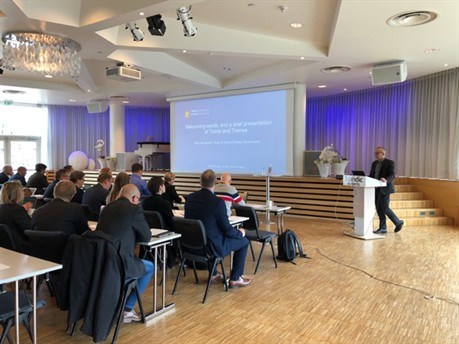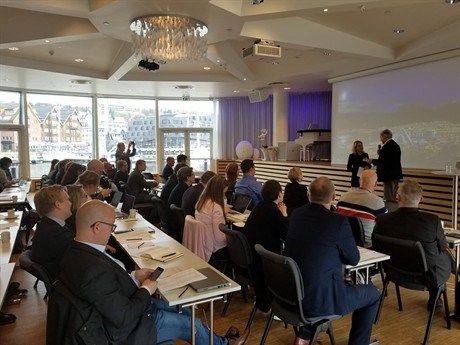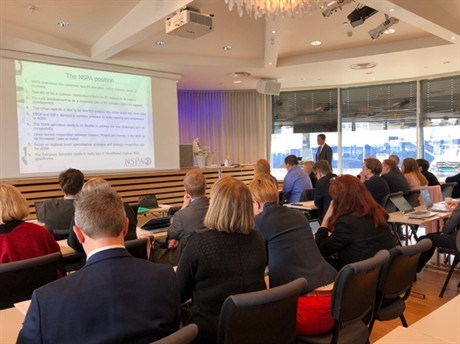The NSPA Forum in Tromsø 15-16 of May 2019
During this year’s NSPA Forum, Norway hosted the conference, which took place in beautiful Tromsø. Interesting issues were addressed, in terms of taking steps forward in the regional development of the Arctic, that lie ahead in the future of Northern Sparsely Populated Areas (NSPA).
Among other things focus was on the prospects for the distribution of the regional development funding during the coming long-term budget for 2021-2027, how the NSPA regions should increase labor mobility across borders and how NSPA will find solutions to challenges that have been made visible in the so called Arctic investment platform (AIP).
Shift of Chair for the NSPA network
Willy Örnebakk, Regional Council in Troms, opened the conference by welcoming the participants. He expressed his hopes that the NSPA regions together can find common solutions to the current existing challenges in the region in order to strengthen corporate investments and the market and ensure the supply of skills in the arctic region. Some of NSPA's common challenges are sparsely populated areas with long distances to the market and ongoing centralization trends. Opportunities for developing transport routes through expanded airports and ports are needed in the region industries like tourism, sea culture and fishing are important to Troms where the population has grown in recent years.

Nils-Olov Lindfors, Regional Council of Norrbotten, and new chairman of the NSPA network, emphasized the positive collaboration that exists in the NSPA regions and which is crucial for positioning the northern European perspectives on the international arena where many players fight for the Arctic. According to Lindfors, one issue for NSPA to address in the future, is that to a greater extent re-invest income from natural resources in the NSPA's regions, which today are taken care of by the state. To sum up Lindfors took the opportunity to thank the former chairperson Satu Vehreävesa for her work as the NSPA chair. In turn, she thanked for having been chair in a such unique and successful cooperation that NSPA is.

NSPA plays a role in the EU
Mikael Janson, Director of the North Sweden European office, presented the direction of the ongoing discussions on the future long-term EU budget for 2021-2027, where NSPA is interested in pursuing its interests. EU regional policy will be tightened when EU funds will be reduced, but NSPA has been successful in arguing for its additional sparse allocation, which is proposed to remain on the same level as today. It is important for NSPA to follow the discussions on that the EU Commission proposes that the future Interreg program will be covered by a larger geographical area and that border programs over water should be removed, but this seems to return more to what it is today in the negotiations which are now inaugurated. The EU has also listened to the NSPA's need to allocate money to competence development by adding some of the extra allocation as funding from the Social Fund which have to reach the regions. Through NSPA, the regions also have been given the opportunity to use regional development funds for infrastructure and broadband development which is important to be able to continue with. These are points that are in the position that NSPA's steering group adopted during the forum.
It is important for the NSPA to include reflections on the next programming period concerning how to work when the EU cooperation program seems to expand its geographical areas, although there will not be a single one for the entire Baltic Sea that was in the proposal. NSPA also needs to look at the possibilities of working with "smart villages" and "regional specificities" with smart specialization across the borders with the aim of building value chains together in the regions. NSPA believes that the EU's urban agenda also should address all regions of the EU, not just regions with big cities, as all sparsely populated regions have cities as well. In conclusion, the results for NSPA do not look too bad, which must be seen as a successful result of NSPA's advocacy work.

The arctic regions in the EU
In the subsequent pass, Mikael continued to give a review of how NSPA have worked with the Arctic issues to put Northern Sweden, Finland and Norway in the center of the EU Arctic agenda and what role it has played for the EU's interest in the region, and increased involvement in the Arctic including investments. As EU wants to link the EU transport system northwards through the Bothnian Corridor through Sweden and Finland to northern Norway, the proposal for this for the next budget term in the EU was completely dependent on the Arctic discussion about connecting EU to the Arctic.
Nils Christian Nilsen, Director of North Norway European Office,who moderated the days, then provided an idea for how the NSPA network work should proceed after the OECD's report, that was conducted by the OECD in collaboration with the NSPA network and launched in the EU during 2017, and the Arctic consultation report that NSPA was involved in developing for the EU, launched during 2018. Challenges that the OECD has pointed out are, for example, demography with long distances to labor markets and a lack of distribution of public infrastructure and services. Therefore, NSPA must increase cross-border cooperation in the procurement of the Sami culture and their entrepreneurship, improve the opportunities for public services, develop the infrastructure to expand smart specialization and improve the conditions for the labor market.
Johannes Lith, project manager in Lapland, presented the pre-feasibility studyArctic Investment Platform (AIP) which had focused on the investment gaps and barriers in the NSPA regions of Finland, Sweden and Norway and provides the basis for an Interreg Nord project.It aims to analyze the demand and feasibility of a structured funding co-operation of the NSPA regions to boost the investment capacity of the regions SMEs, produce a framework for a support system to ensure credible resources to engage in a dialogue with institutions relevant to the set-up of such a system (incl. regional stakeholders, national funding agencies, financial institutions, European Investment Bank (EIB), European Commission and national ministries in each of the three countries). At the end of 2019 it is estimated to publish a study on implementation with a road map.
The Arctic investment platform, initiated via the NSPA network, is welcomed by the NSPA as the regions need to attract foreign investors in order to increase the link between investors and existing micro-enterprises and increase knowledge about the actual supply and demand.
Big needs of investments in the NSPA regions
The presentations and discussion highlighted important issues for NSPA. Transport infrastructure is crucial for connecting the Arctic region. Thereby, digital infrastructure is relevant to NSPA such as the expansion of data centers and a digital e-society. In addition, industries with smart specialization in industries such as biotech, tourism, ICT, mining industries, machine technology and more. Health, well-being and building attractive Arctic cities are crucial for retaining labor and attracting new residents. In addition, it is in the NSPA's future to think about how to develop educational opportunities, competence development and integration of migrants.
In the following panel discussions, the question concerning the importance of more knowledge about micro companies in NSPA was raised. This is so that stakeholders have knowledge of where to turn when starting an Interreg project. NSPA should increase cross-border collaboration between companies. There are currently platforms for regional development, but a platform is needed to do business where companies and research can find each other. In addition, discussions were held around that the regions have to start to work on communicate contacts to a greater extent between companies and regional projects. One idea is to to start up a forum with only regional companies and a clear agenda focusing on expanding and cross-border collaboration.
Finally, the participants listening to results that the Arctic Labor Pilots project has come up with. They have focused on the challenges of hiring individuals over the NSPA's national borders, education and skills provision. In the project, over 1,000 individuals have participated in activities and 22 job opportunities have been created in which 9 people have moved across national borders.
The next steps for NSPA
During the concluding discussions about the way forward for the NSPA regions, several ideas came up to be considered. NSPA should establish a coordinating group of officials working at home in the regions. It would be good to create a digital cluster map that all stakeholders in the NSPA can use in order so make businesses and enterprises visible to be able to cluster over all of NSPA. In addition, an intermediate link is needed that can promote projects for collaboration between stakeholders based on the established collaboration between the universities within parts of NSPA, the so called Arctic Five, as a potential enabling platform.
It is positive for the NSPA that Finland will hold the presidency of the EU council after Romania during the second half of 2019. As a president in the European Council, Finland will get influence over the EU agenda therefore and a unique position in the European collaboration. This is indeed something that NSPA should also see to possibilities to contribute to and benefit from. From the NSPA we wish Finland great success during the presidency of the EU council the coming six months! We also look forward to the next NSPA forum 2020 that will take place in the region of Västerbotten, Sweden. More information will come later on.
Read more about the Arctic Investment Platform
